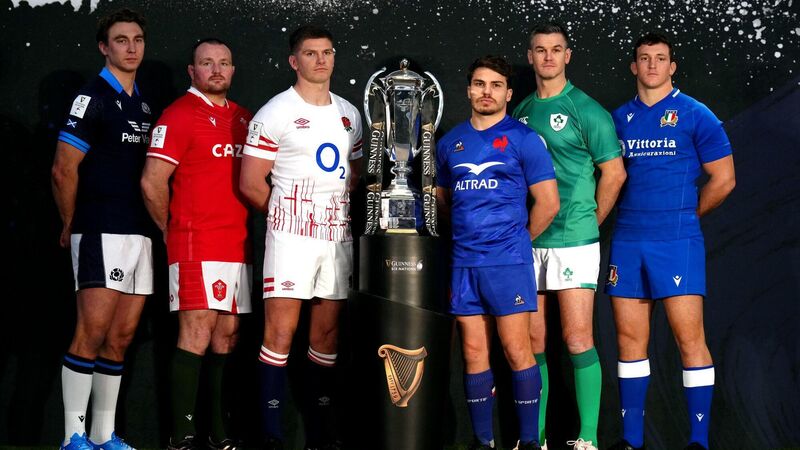Ian Mallon: How Guinness grew Six Nations deal from acorn to oak

LAUNCH: Scotland captain Jamie Ritchie, Wales captain Ken Owens, England captain Owen Farrell, France captain Antoine Dupont, Ireland captain Johnny Sexton and Italy captain Michele Lamaro (left-right) stand with the trophy at the launch at the Guinness Six Nations launch. Pic: John Walton/PA Wire
The ancient and prestigious Towns Cup, Ireland’s provincial junior club competition, was once the sole investment by Guinness in rugby sponsorship.
Today the company brand will be seen by more than 100 million fans over the Six Nations Championship in a sponsorship that is amongst the most potent commercial deals across all of sport.
In the world of hyper sports partnerships - think of Gatorade and the NFL, Rolex and Wimbledon and even Nike and the NBA – then you’re in Guinness and Six Nations Rugby territory, where a brand not just dominates, but owns its chosen sport.
Broadcast images will show fans raising their branded beer cups in the stands, while on the playing surface a huge corporate logo will provide the backdrop for all sporting action – and all for an investment of €120-150m over six years.
The current deal ends at the end of next year, but already the indications are that it will almost certainly be extended beyond that term for a brand that simply must be part of rugby.
Separate deals include the various pouring rights packages which Diageo enjoys with the ‘home nations’ unions and their stadia, through which it will serve up to €10m worth of hospitality throughout the Six Nations and Autumn Series schedules.
For Six Nations Rugby the deal represents a considerable success which has helped balloon the value of the organisation to approximately €4 billion, up considerably since its part acquisition by CVC Capital in 2021.
However, the most fascinating story comes through the tale of the origins of the sponsorship – which Diageo says happened in the 80s, but which IRFU figures believe goes back to the early 1970s.
Shortly after its 1965 takeover of Smithwicks and its St Francis Brewery in Kilkenny, Guinness & Co. quickly created a draught ale, which it then set about marketing and creating brand awareness.
Rugby was seen as the way to go to build a new market outside of the traditional flat-cap bottle pourers of the past, and quickly the prestigious and ancient junior club competition, the Towns Cup, was seen as a way in.
The tournament had been around since 1888, was participated and followed by a high-income, ABC1 audience, from large urban centres across the country.
Around 1970 and into 1971, according to former IRFU President Pat Fitzgerald, a fee of approximately £1,000 was agreed for the sponsorship rights of the Towns Cup, and so began Guinness&Co’s first foray into rugby.
The magic from the deal for rugby was that Guinness&Co would take over the marketing and promotion of the competition and its fixtures, helping to lift the profile of the competition and the sport across communities.
Fitzgerald - something of a commercial beast across rugby from the amateur game into the professional era where he worked with Leinster and Ireland commercially - told The Pitch that another valuable concept became a reality.
“There was the whole hospitality aspect, in that if you were lucky enough to get a ticket for the Smithwicks tent at the Provincial Towns Cup Final, you really had a golden pass,” he explained.
“As a competition the Towns Cup was a fabulous networking event for supporters and those involved with the clubs, and very, very quickly Smithwicks began to get huge brand recognition from the partnership.”
Part of this amplification saw Smithwicks taps installed in every rugby club in the country, adding to the rich marketing of the brand within its select audience.
The product’s involvement with the competition ended in the early 1990s, by which time the financial and banking boom had taken hold, with Bank of Ireland, Bank of Scotland and ACC Bank all taking turns to sponsor the Towns Cup.
This experience had adequately prepared Guinness, under the new ownership of Diageo, to step up from junior club rugby to the international stage where Fitzgerald had led the brand’s introduction to the IRFU.
Firstly it took over the sponsorship of the East Stand at Lansdowne Road, and then Fitzgerald agreed a historic pouring rights deal at the stadium, right up until its redevelopment into the Aviva in 2007.
Those hospitality assets continue to this day, where Diageo brands including Carlsberg and Rockshore enjoy exclusivity within the ground and across the other home nations stadia.
From there Guinness increased its rugby footprint with sponsorship of the Pro14 and in England with partnerships with London Irish and of the English Premiership – but the key move came in 2019 when it became headlines sponsor with Six Nations Rugby, where large financial services businesses had thrived.
The 2019 deal coincided with Heineken’s return to the European Champions Cup and also followed a tentative period for all beer partners where the threat of a potential blanket ban on advertising hovered.
That issue now seems rooted in the past thanks to the gift of zero alcohol products, of which, you’ll notice Guinness 0.0 being promoted around the Six Nations Championships.
The incredible development and growth of the sponsorship is best summarised by Pat Fitzgerald.
“I would compare that initial Smithwicks deal for the Guinness company in the Towns Cup as like an acorn planted in rugby, from which a huge oak has grown into this extraordinary Six Nations success,” he said.
The Camogie Association’s highly anticipated plans to rebrand the organisation, on foot of a major sponsorship investment by Carmel Naughton and Glen Dimplex last year, has been shelved.
The association went to market last September inviting tenders for a “review of the current brand identity and development of a clear tagline which meets our ambitious goals (as an organisation which) competes above its weight in the sporting landscape”.
A key challenge for the Board was outlined as one which must engage with younger audiences while ensuring that the traditions and history of the body prevail.
While eager to keep its current corporate identity, the Camogie Association told prospective tenders that it wanted a new logo to attract that key younger audience, and a tagline, along with a suite of corporate brand guidelines.
The key timelines for the rebranding of the Camogie Association were due to be October 10 for submission, with the selection of a shortlist of agencies by October 24, from which the successful candidate would be selected.
The final designs and submissions was due on December 2 before an unspecified launch date, however, the Camogie Association contacted applicants in recent days to advise that it had made the “difficult decision not to progress with a full rebrand at this time”.
The reason given for the sudden ending of the plan was down to a series of unspecified changes within the organisation and its work environment.
The rebrand of the organisation coincided with the end of Camogie’s first season of a seven year deal with Glen Dimplex and its key stakeholder Carmel Naughton, which was activated at the beginning of last season.
When asked if Glen Dimplex had any input around the ending of the rebrand the company did not respond, although such involvement would be most unusual.
‘If you want to be the best, then follow the very best’ might be the new mantra for Irish volleyball.
Volleyball Ireland has joined forces with Italy, the European number one playing nation and its federation (FIPAV) in a unique and historic partnership for the growth of the game here.
The deal will focus on player development, coach education and organisational capacity, where the Irish will take key learnings which have made the Italians a leading force in the men’s and women’s game.
Irish players will spend much training time alongside their Italian counterparts, while the Italians will also deliver coaching course and workshops to their Irish colleagues, with significant focus on development, event management and youth programmes.
Volleyball Ireland President Clodagh NicCanna, who helped broker the deal, said the project “gives Ireland an amazing opportunity to learn from the world’s best youth development programme, and undoubtedly one of the most successful Volleyball nations on earth”.








